If you have landed here, I am guessing you are in an interethnic relationship/marriage and are interested in raising a bilingual child.
Or, maybe you are a first, second or third-generation immigrant and want to raise your child speaking your native tongue.
Or, perhaps you simply love languages and/or know the benefits of being bilingual and want to jump start your child during the early stages of their language acquisition years.
Regardless of your background, you are here because you want to know more about raising a bilingual child, and you have come to the right place.
Today, I am going to share 13 facts parents who want to raise a bilingual child need to know.
Make sure to follow us on Instagram for more bilingual parenting tips and advice!
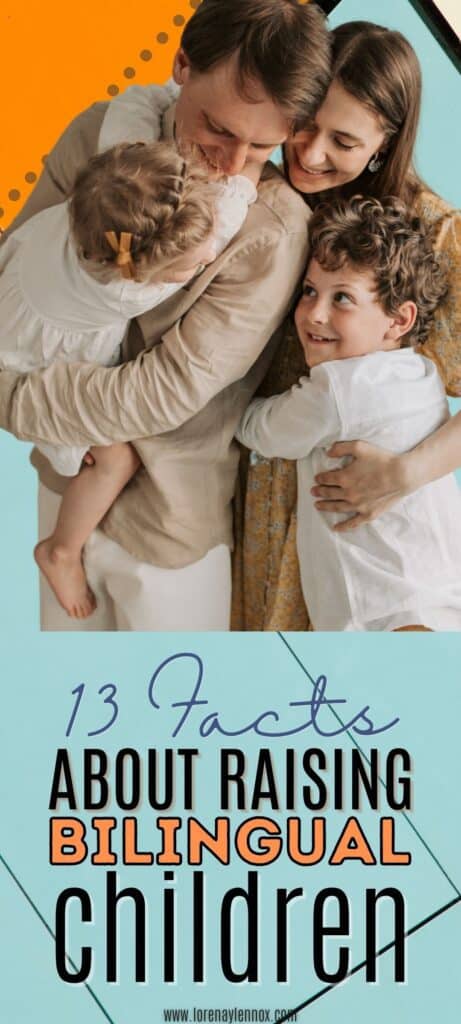
First, let me tell you a little bit about my bilingual parenting background.
I was born and raised by monolingual parents in the United States. As a requirement, I started learning Spanish in high school. I had no prior interest in learning languages.
When I was 15, I traveled to Nicaragua on a mission trip where I fell in love, not only with the language but also with the culture. It was a real amor a primera vista (love at first sight).

Never in my life had I felt so passionate about something. I felt on fire, and I wasn’t going to put out that flame until I conquered the language.
Later. I went on to college, and even though my mom wanted me to study business, I was not interested in anything but learning Spanish and traveling. In college,I studied abroad in Panamá. After that trip, I decided that Spanish wasn’t enough. I wanted more. So, I started learning Portuguese and Italian.
Then, in 2011, my life came to an abrupt halt when I met my Salvadoran partner, Carlos.
Carlos fascinated me, especially his Spanish. I was always listening for new words, and I loved hearing the different tones of the Salvadoran dialect.
I was obsessed with his culture. Especially his food. Oh, the gloriousness of Salvadoran food—pupusas, carne asada, ceviche, pescado frito, and the list goes on and on with savory delight.
Meeting Carlos is when my “bilingual beginnings” began. I was able to put all of my education and experience into everyday use. After the first few years of our relationship, I realized that I no longer needed to think before I spoke in Spanish, which was a triumphant feeling.
Related: 12 Ways to Become Fluent in Spanish Outside of the Classroom
After six years, Carlos and I settled down and decided to expand our love and bring our family. So, in 2017, I delivered my precious ball of sleepless and colicky joy to the world.
I couldn’t wait to raise a little Spanish-speaker.
Lennox is three now and speaks more Spanish than me!
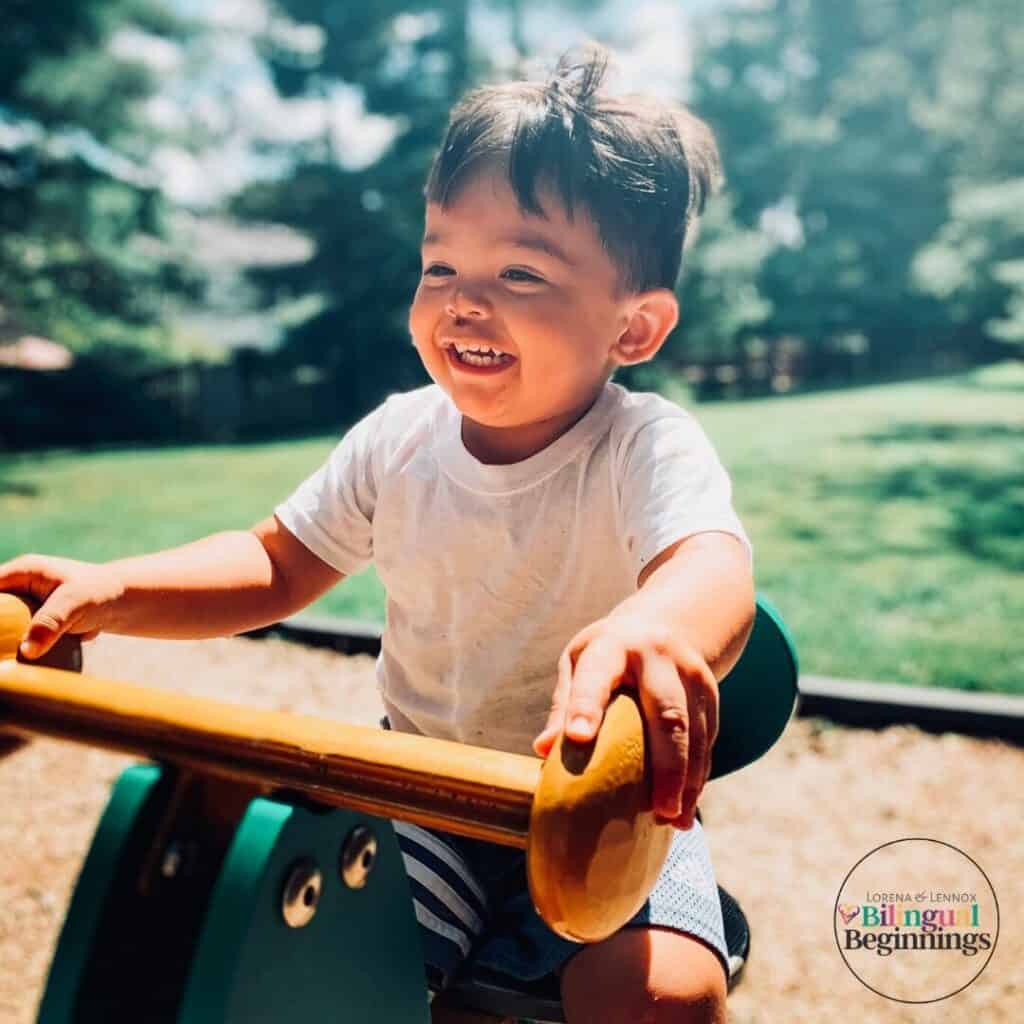
Since birth, we have raised him bilingually using the Minority Language At Home (MLAH) approach. That means that we use Spanish at home and out and about as a family as much as possible.
*Updated September 2021: Now we raise Lennox using the Mixed Language strategy! This strategy is a little bit different than MLAH, but we still nurture the minority language as family!
Raising Lennox in my nonnative language has been far from easy. As fluent as I consider myself in Spanish, they don’t teach you nursery rhymes or onomatopoeias in Spanish class. Un perro hace wau wau, not woof, woof.
Hence it has been a learning process for me as well.
Related: Free Spanish Printables for Kids
To quit boring you with my background, I hope to shed some tips on you if you are in the process or plan to raise a bilingual child. These tips are not meant to discourage you from your bilingual parenting journey.
As Kevin Wong states:
“though raising children is often a thankless job, bilingualism is a gift that they will undoubtedly thank you for one day.”
If you stick with it, you will never regret it.
Leave me a comment below with your experiences with bilingual parenting, and make sure to subscribe for weekly bilingual parenting tips and advice.

Bilingual Parenting Fact 1: Raising a bilingual child requires a lot of hard work
Raising a bilingual child is not easy and requires a lot of research and planning about how you are going to raise your child bilingually.
There are multiple approaches to raising a bilingual child. Two of the most common are
- One Person, One Language (OPOL). With the OPOL approach, one parent speaks one language to the child, and the other parent speaks the other.
If I used this approach, Carlos, who is a native Spanish speaker, would speak to Lennox is Spanish, and I, a native English speaker, would talk to Lennox in English.
Using this approach, children get used to hearing both languages on a daily basis. I read a recent article that says that this approach is the “most effective and successful” way of raising a bilingual child.
The second most common approach is MLAH, Minority Language at Home. In this approach, the non-dominant language is spoken only at home. This way, children get a solid foundation of the language at home, and in society, they pick up the dominant language.
This is the method we use in our household, and it is very effective.
Another less studied approach is the Time and Place (T & P) approach that is great for parents who might not be fluent in a minority language, or want to introduce a language to their older children.
There is also the mixed languages strategy which requires two bilingual caretakers of the same language. If done right, this strategy can be highly effective!
Bilingual Parenting Fact 2: Raising a bilingual child requires massive exposure
Raising a bilingual child requires constant and massive exposure to the non-dominant language.
In-home exposure through reading, singing, talking, music & play.
At home, I often read to Lennox. I am building up his Spanish library, but books are not cheap. Click here to see ways that I read to Lennox without having books in the target language.
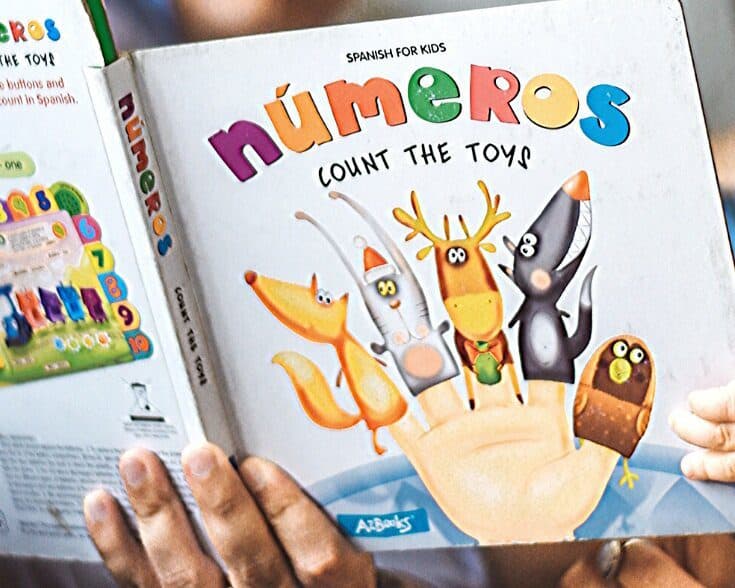
We also play different types of Latin and Spanish music, and we do a lot of in-home Spanish activities.
Check out our free activities in Spanish here
Sometimes, I need to tend to my motherly duties and do occupy screen time. However, I have changed all of our cable settings to broadcast in Spanish.
Even though technology might seem like a useful resource for language learning Perri Klass, M.D states that:
“in order to foster language development, the exposure has to be person-to-person; screen time doesn’t count for learning language in young children — even one language — though kids can learn content and vocabulary from educational screen time later on.”
Exposure outside of the home is valuable too.
Spending time with family and friends that speak the target language. Going to cultural events and activities.
Experts say that “If children are exposed to a language in a variety of circumstances with many different people from the time they are born, and if they feel they need the language to interact with the world around them, they will learn it.”
Related post: 9 Outdoor Language Learning Ideas for Kids
Bilingual Parenting Fact 3: Consistency is key
Whichever method you choose to raise your bilingual child, you need to stick with it.
This is difficult for me as a nonnative speaker, because sometimes, when I’m flustered or preoccupied, it’s just easier for me to say what I need to say in English. However, I try my hardest to always speak to Lennox in Spanish.
Bilingual Parenting Fact 4: Parents need to encourage the language
If parents do not push for a need to speak the less dominant language, it is very easy for a child to go from being bilingual as a baby/toddler, to only speaking the dominant language once they begin school.
Unfortunately, this happen too frequently among first-generation immigrant families, especially in the Latino community. I see parents who speak zero to little English and their children who struggle to speak Spanish.
Not only does this cause hindrance in family communication, but it impairs the child from learning either language to the fullest potential.
Bilingual Parenting Fact 5: The earlier you start, the better
It’s never too soon to start speaking to your child in the target language. In fact, the earlier, the better.
In second language acquisition research, critical period hypothesis states that the first years of a child’s life are the most important to acquire a second language when presented with the appropriate amount of exposure. After the first few years, it becomes more challenging for a child to gain full command of the language and grammar.
Related: 20+ Interactive Bilingual Spanish Toys for Babies & Toddlers
Bilingual Parenting Fact 6: Don’t forget about the culture
If you are not exposing your child to the culture behind the minority language, there is no point in trying to raise a bilingual child. Expressions are cultural, sense of time is cultural; everything about a language is cultural.
Brian Oaster states it perfectly: “ If we look at language as simply a network of words and phrases, language learning becomes lifeless and robotic. That doesn’t mean it’s impossible, but such an approach would omit layers of meaning behind the words.”
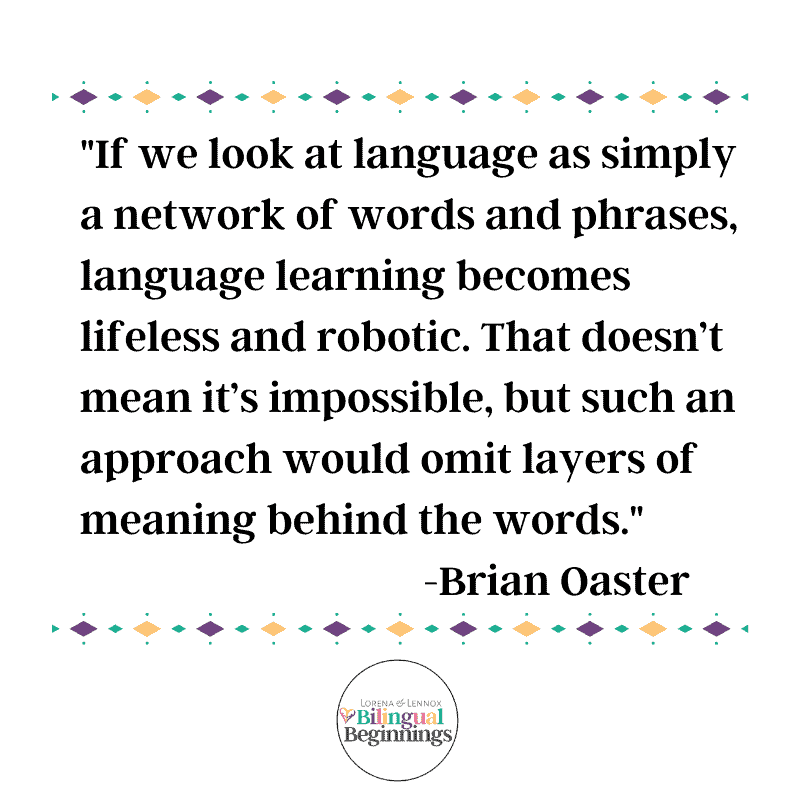
Besides language and culture being inseparable for language acquisition, exposing children to diverse cultures impacts the way they think, behave, and affects their relationship with others.
The Conversation has a great article that goes further in detail about the connections between culture and language. It is a topic I would love to research more in detail because, from my point of view, traveling and living in other cultures was the motor behind my language learning. It also made me more empathetic and understanding of the world and the reality that third-world countries face.
To this day, I still learn new cultural distinctions in the way Carlos talks, moves, acts, eats, etc.. For example, sometimes, when he is signaling something, he uses his lips instead of pointing as I would have done. This is a nonverbal cultural difference, and understanding it is just as valuable as understanding verbal and written communication.
Bilingual Parenting Fact 7: Be playful
Adopting a playful parenting approach will be very beneficial in language learning. I find that when I am on the ground, playing with Lennox, he is at his calmest. It is also a great time to talk in the target language, about anything and everything. Act out a car chase, play with barbies, build a house, etc.
Karen Banes from Rose and Rex describes how playful parenting is beneficial in all parenting situations and that it has the following benefits; play fosters respect, lightens the mood, allows for the right type of attention, and sends a message.
One of our favorite types of play to encourage communication is loose parts play and sensory activities.
Bilingual Parenting Fact 8: Code-switching is a thing
Code-switching is when you adopt words from one language when speaking another. A great example of code-switching is Spanglish.
Do not worry;
this is not a sign that your child is confused. Sometimes it is just easier to say things in one language, and it is the preferred word choice.
For example, Lennox has a hard time pronouncing gracias, so instead; he says, “tank you”. The same goes for por favor. He understands por favor and gracias; however, he has taken a preference for “tank you”, and “pwease”.
Related post: 10 Misconceptions About Raising Bilingual Children
Bilingual Parenting Fact 9: It may result in a delayed language development
Your child will be learning two vocabularies and cultures instead of just one, so this may cause delayed language development.
In Lennox’s preschool class, I would say Lennox is one of the quietest, verbally speaking. However, his actions speak way louder than his words. At a little past two-and-a-half, he is starting to form sentences that I can understand. From a bystander perspective, it might just sound like babbles. I had a friend ask me two days ago, “when is he going to start speaking?” This is a remark I get quite frequently.
*Update November 2020: Lennox never stops talking! He prefers Spanish but can easily go back and forth between languages. He also understands that he speaks two-languages and can compartmentalize each language.
Do not let a language delay discourage you from cotinuing your bilingual parenting. Some kids need a period of time to observe, but they are absorbing everything they hear.
Here’s some advice:
Be patient. Unlike monolingual children, bilingual children are learning two vocabularies and two cultures. Naturally, it is going to take more time to process and compartmentalize each language.
Talk, Talk, Talk. Talk as much as you can about everything. One of my favorite places to induce conversation is in the car. Lennox cannot run from me in his car seat, so I like to ask him about what he sees, or sing songs, etc. Find little pockets of quiet time throughout your day to talk.
Explain and Encourage. Due to delayed communication, some bilingual children will grunt, hit, or bite to protest. Get on eye-level with your toddler and explain the situation and encourage him to use his words to express himself. This tactic works to calm Lennox and to share his thoughts.
Repeat. Focus on different learning activities times and repeat the words over and over again.
Bilingual Parenting Fact 10: Your child might not be interested in speaking the target language
This is why it is vital to introduce culture and make the language learning experience fun. This will deter your child from loosing interest in speaking the minority language.
Establish norms around the house. For example, when Lennox says something to me in English, I celebrate his bilingualism, but I remind him that in our household, we speak Spanish.
I’m not sure what the future will entail, but I hope that he will follow my wishes and only speak Spanish at home. I will let you know in a couple of years.
Bilingual Parenting Fact 11: Siblings might not be as bilingual as the first born
Siblings might be exposed more to the dominant language through firstborn, which will then consequently cause the siblings to be less bilingual.
I have witnessed this phenomenon with my in-law’s children. Their oldest children speak Spanish very well, but once they start school, they bring home the dominant language and speak it around the younger siblings who are eager to emulate.
Bilingual Parenting Fact 12: You will receive pushback
There are so many myths and misunderstandings about dual language acquisition that you will get pushback from family, friends and society in general.
Don’t let this discourage you, let it add fuel your fire, and remind yourself of the many benefits of being bilingual.
Bilingual Parenting Fact 13: Lastly,
Thanks for sticking with me thus far. The last and best fact you need to know about raising bilingual children is that…
it will be the absolute best parenting decision you will ever make.
You are setting them up to be more successful, diverse, compassionate, and open-minded. They will grow up to be so thankful for your perseverance and dedication in their journey.
I am just so excited for you and want to take part in your journey. Please leave me a comment below with your thoughts/opinions/experiences on bilingual parenting, and don’t forget to subscribe to receive our weekly newsletter.
Related posts you might enjoy:
- Seven Ways That I Teach My Toddler Spanish as a Nonnative Spanish Speaker
- 10 Misconceptions About Raising Bilingual Children
- Strategies to Raise Bilingual Children
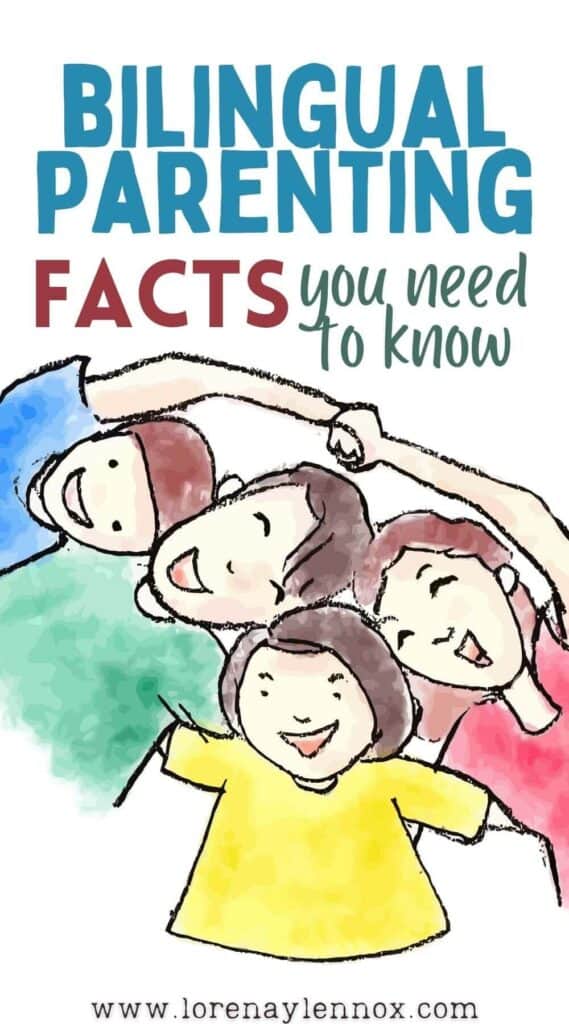
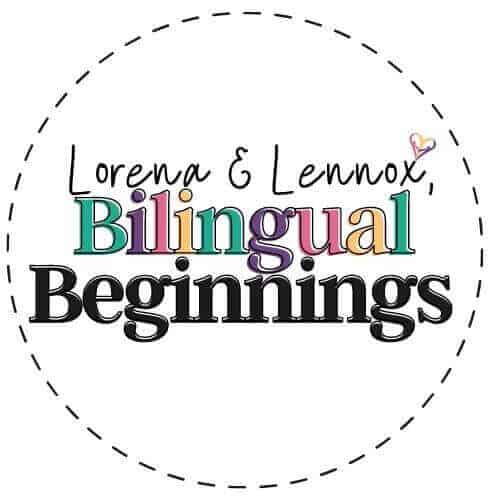
Elina
Monday 17th of July 2023
My mom is from Japan and my dad America. I grew up in the states while my mom spoke only Japanese with me. I’m probably about 2nd grade speaking level and have a nearly perfect accent. I’m just mostly lacking vocabulary, the slang that people my age speak (I’m 24), and sometimes my English intonations get mixed in with my Japanese. I have a daughter who is two and have recently decided to start speaking only Japanese to her. My husband only speaks English. It has been especially tiring to speak with her since my japanese is not my main language and I am not 100 percent proficient in it. However, I have this skill and I am very grateful for it. And I know my daughter will be greatly blessed from having this skill a well. I plan on putting her in the same Japanese class I went to growing up once a week. This is so much work and very difficult. But I hope it turns out for the better
Lorena
Sunday 23rd of July 2023
Elina, It's incredible to hear about your multicultural background and your dedication to passing on the Japanese language and culture to your daughter. Embracing your heritage and providing her with the gift of bilingualism will undoubtedly enrich her life in countless ways. While it may be challenging at times, your effort and commitment will surely pay off, as she will grow up with a unique advantage and a broader worldview. Your decision to enroll her in a Japanese class is a wonderful idea, and I believe that with your love and support, she will thrive in learning and embracing both languages. Stay strong, and know that your hard work will undoubtedly turn out for the better, fostering a strong bond with your daughter and building a bridge between cultures that will benefit her throughout her life. Keep up the fantastic work!
YN
Friday 30th of September 2022
Bilingual Parenting Fact 11: Siblings might not be as bilingual as the first born.
Hello,
Thank you so much for sharing your story and your knowledge . i am raising bilingual children.
The solution that I came up for fact #11
When I had my second child and they were speaking in English more than Spanish. I taught them that they are not allowed to speak to each other in English, only in Spanish. This has helped to the point that my little one started talking in Spanish early and talks better than when older two two were the same age. I only speak Spanish to them and if for some reason they speak English, I tell them that I do not understand what they saying so they tell me in Spanish. I will not respond to them if they talk to me in English. Like you say, you have to be consistent and it is a lot of work too.
torres
Wednesday 1st of June 2022
I found this blog so amazing. So much information, and it's all so well organized. . This is going to be a valuable resource for me. Thank you so much for creating it! Read another amazing blog : https://lead-academy.org/british-sign-language-alphabet/
Erica
Saturday 26th of February 2022
I have a similar story but with an Argentine husband. My oldest (6) understands and speaks more Spanish than the second (4) but plays in all English every since she went to school. The baby (1) I try to speak to only in Spanish as we did with the other two for their first 2 years. My battle is keeping the Spanish going at home. My husband has even switched to more English. We just keep going the best we can! Thanks for pooling resources and ideas.
Lorena
Friday 1st of April 2022
Erica,
Thank you kindly for reading and sharing your bilingual story.
I totally relate to your battle of keeping the family's language in Spanish. I struggle with this on a daily basis. The pull towards English is very strong. Nonetheless, we fight to win the minority language battle.
Thank you for reading and commenting!
Viola
Friday 21st of May 2021
Hi Lorena, thank you for the article, I enjoyed reading it, and will follow the instructions once the baby is born. However, many of my friends have experienced “bullying” in the early childhood, because of their poor to none main language, when went to the kid-garden or school, which made them hate and deny in every way, their minority language. How do you suggest acting in this case? I mean, isn’t it too painful for the parents to understand they causing this to their child, and continue with the strategy?
Sarah
Monday 13th of September 2021
Hi Lorena,
I have a really similar story! My husband is Argentine, and I'm a US native who speaks Spanish moderately well. I only speak English with my husband, but we both only speak Spanish with our 2 year old daughter. She is so bubbly and outgoing, but no one understands her. Kids and their parents at the playground give her weird looks and don't respond to her, which breaks my heart.
I've wanted to be a MLAH house, but I'm worried that she's not going to have any socialization AND it's getting harder for me to try to calmly explain things to her in Spanish when both of our tempers are high. I'm missing all of the softer language I can use in English, so I've been considering switching to one parent - one language.
Any thoughts on me suddenly speaking a different language with her at 2 years old? Her caregiver would still only speak Spanish with her, and we plan to spend 3 months a year in Argentina.
Lorena Ruprecht
Saturday 22nd of May 2021
Viola,
Thank you for your sweet comment, and congratulations on your baby!
I am so excited for you to embark on your bilingual parenting journey!
Regarding the bullying, I have not made it to that chapter of life yet with my son, Lennox. However, I make a huge effort every day to tell him how important it is to speak his heritage language and how useful it will be for him in the future.
When he is around his monolingual friends, I stay firm in speaking Spanish with Lennox, and when his friends ask me why we speak in Spanish, I give them a fun and light explanation as to why it's important for us.
Also, around his Spanish-speaking cousins, I highly encourage them to use Spanish, and even though they all gravitate towards English, I create fun games or contest to keep them speaking in Spanish.
Once Lennox starts school, I will encounter different situations that I cannot quite speak on yet. However, I hope that by openly talking about the importance of language in our household, he will feel confident enough to hinder the bullying comments.
I hope this helps! Please feel free to reach out to me at my e-mail [email protected] or on social media if you have any more questions.
Lorena